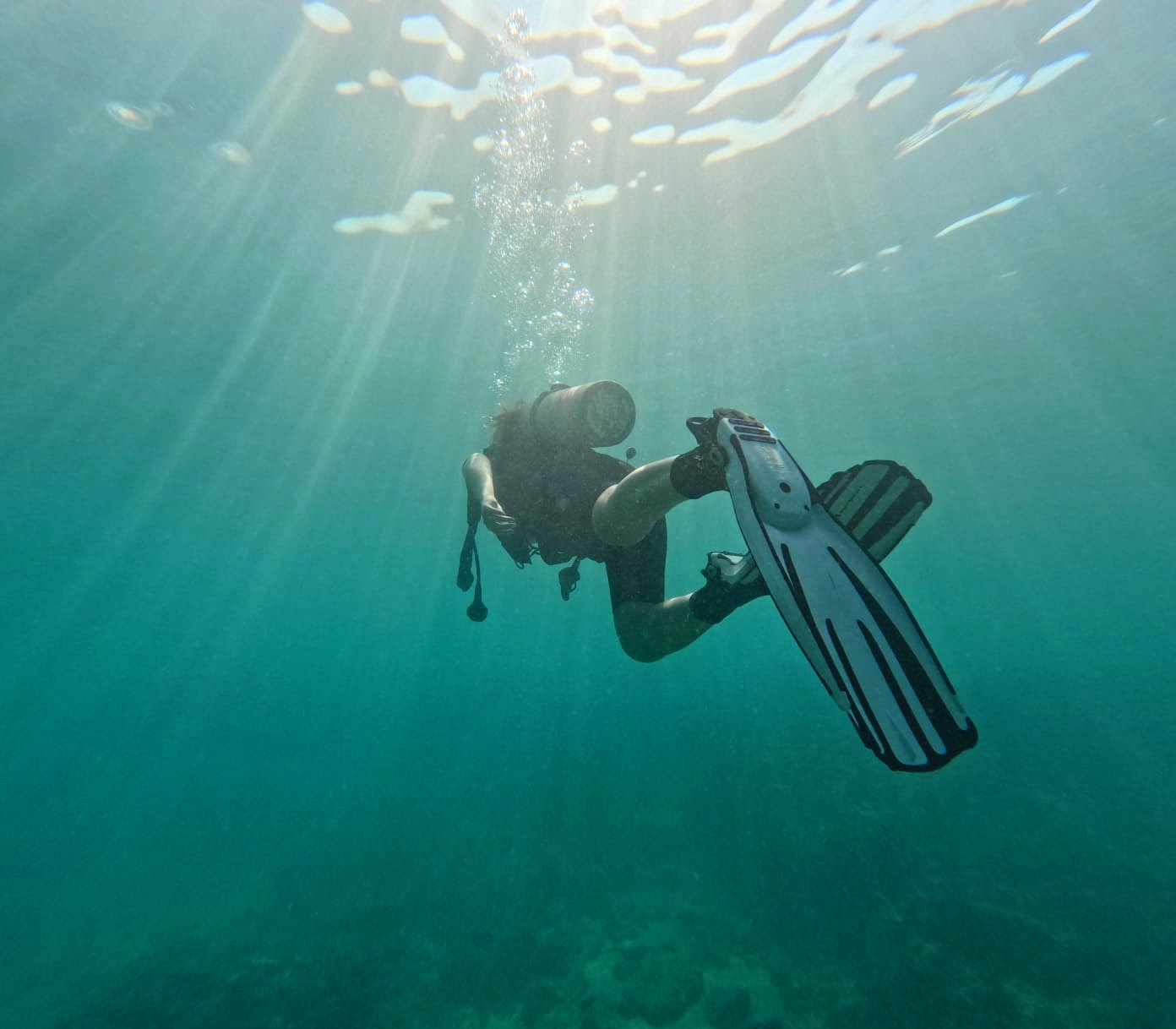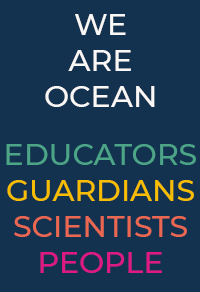Guardians of the Blue: lionfish hunting and ocean cleanups in Lebanon
Welcome to EMSEA’s new blog series ‘Meet the members’ in which you’ll get to know the EMSEA members, what drives them and what inspires them. They’ll share their experience, their good practices, their challenges. They’ll talk about what ocean literacy means to them and how they hope to reach it. Today we meet Laura Khatib, co-founder of the Lebanese Guardians of the Blue.
Passionate.
If I could use only one word for describing Laura Khatib, co-founder of the Lebanese Guardians of the Blue, that would be it. I met with her online, but even separated by 3,200 kilometres, 2 screens and 1 time zone, I could tell: this is a woman on a mission.
Laura is many things: (blue) economist, ocean lover, science communicator, freelance consultant, ECOP ambassador and one of our own EMSEA advisors. She is also co-founder of the Lebanese Guardians of the Blue, an NGO she founded with her fiancé Samer Lakiss, scuba diving instructor at Xiphias Diving.
Founding and coordinating an ocean literacy NGO in Lebanon is a challenge, to say the least. Scientific research in the Lebanese sea falls short, the country’s government has other priorities and the Lebanese population knows very little about marine life.
The latter became painfully clear after the shark attack in Egypt in June 2023 that killed a 23-year-old Russian. ‘The Lebanese people were really afraid. There was general paranoia and a lot of false information was being shared. There were even fishermen who wanted to go and kill sharks to protect the people. They meant well, but it really showed a lack of knowledge. We had to do something.’ She made a flyer containing basic information about sharks to inform the public and was interviewed by a local newspaper to talk about it. Spreading knowledge and awareness: it’s what ocean literacy is all about. At the moment, Laura is focusing on three pillars.
The lionfish project
The first is the lionfish project. Lionfish is an invasive species that entered the Mediterranean from the Red Sea and arrived in Lebanon in 2012. With Guardians of the Blue, Laura and Samer are now trying to promote the consumption of lionfish. Since entering the Lebanese sea, Samer saw an explosion of the population in just a couple of years. Inspired by what local communities did in the Bahamas, that faced the same issue, he started lionfish hunting on a daily basis. Hiding away under rocks, lionfish are quite tricky to catch but Samer learned how to do this by spear while scuba diving. During summertime he goes out every day, hunting up to 24 kg per dive.
The local community is not familiar with eating this species yet, so for now only a few restaurants and fishmongers could be convinced to serve and sell them. In the long run Samer and Laura hope to spread the habit of eating lionfish across the whole community. ‘It is the most sustainable way of eating fish now. As an invasive species, we can’t get rid of it anymore, but it’s really messing with the ecosystem. Hunting them helps the other fish. It takes some of the pressure away from other species. And if you’re going to kill them, you might just as well eat them. It’s really delicious, you know. And they’re great for making jewellery', she adds with a smile, showing me these wonderful earrings made from its colourful fins. Her jewels are inspired by Caribbean handcrafts and she hopes to spread the craft in the community.

Education
A second pillar Laura is focusing on, is education and awareness. By spreading the already mentioned shark flyer, for example, but also by making informative posters for the diving club Samer works at. These inform visitors on which marine species are present, general facts about the Mediterranean Sea and pollution in Lebanon. For EMSEA, she translated the Mediterranean Sea Literacy booklet in Arabic, so people from Morocco to Syria can feel involved as well.
She’s also working on raising funds for a marine documentary series. ‘François Sarano said that the best way for people to start caring about protecting the ocean, is to be in the water, to meet these creatures, to see them,’ says Laura. ‘But scuba diving is quite expensive and not everyone has access to that way of connecting with the ocean. Therefore, what is beneath the surface, is unknown to many people. Sharing visuals can bridge that gap.’ It’s what she’s already doing on the organisation’s Instagram account, that has over 1,000 followers. The documentary might reach even more people.

Cleanups
The third pillar are the underwater cleanups. ‘To me, one of the main challenges in ocean literacy is going from education to action. Informing people is just the first step, but how do you engage them, how do you inspire them to actually do things?’ The underwater cleanups that Guardians of the Blue organises with Xiphias diving club are a step in that direction. With over 20 volunteers, the organisation already removed over 3,600 kg of waste from the water, of which a large part were car tyres, that are used in the harbour to protect the boats from bumping against the dock and then often end up on the seabed.
Doing all this in the context of hyperinflation, the 2020 Beirut explosion, the vacancy in the Lebanese presidency and the overspill of conflicts in Syria and Israel, keeping this NGO afloat is the product of hard work and a lot of passion. ‘With all that is going on here, it’s hard to make long term plans. We try, but our situation is very unstable, both financially and politically. The only reason we keep going is our deep and sincere passion for the ocean. I think, if we were not so passionate, we would probably already have given up. But our ocean love is what drives us. We want to protect it, we want to educate people about it and we want to inspire them to act on that knowledge.’
Top tips for Ocean Literacy organisations by Laura Khatib
- It’s important to visualise what is unseen. Life under water is not accessible for many people. Images can bring that world closer by and make it more tangible.
- People are more engaged when you share something you’re truly passionate about. If they feel your love and passion, they’re more likely to be inspired and share that feeling.
Text: Anke de Sagher for EMSEA
Photos: Guardians of the Blue
Want to join the community? Find out how to become an EMSEA member!
More on Guardians of the Blue:



